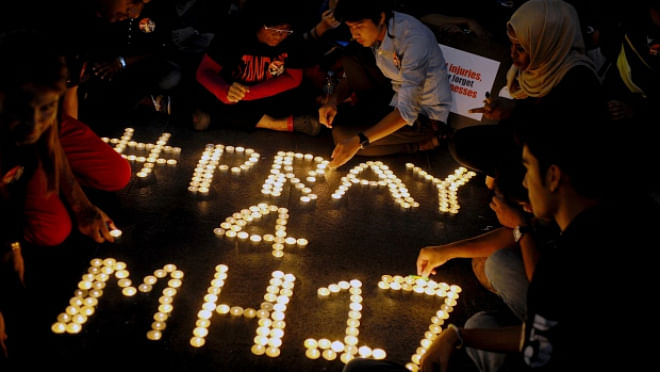Leadership and a downed plane
Leadership and a downed plane

The tragic downing of flight MH17 is now a test of leadership. While some politicians have demonstrated respect for lives lost and reacted with restraint, others have sought to capitalise on tragedy to propel self-serving, national and geopolitical interests.
The downing of Malaysian Airlines flight MH17 over eastern Ukraine once again reminded that the world is interconnected to an unparalleled degree. The loss of almost 300 lives shows how localised unrest can have a devastating impact on people far removed. We can never know how many of MH17's passengers considered East Ukraine's struggle as anything beyond a news curiosity. Yet that turmoil claimed their lives.
Information allegedly retrieved from tapped phone conversations and online statements from pro-Russian fighters would seem to implicate them. The same evidence suggests the plane was mistaken for a military aircraft and targeted by accident.
It wouldn't be the first time that has happened. In 1983 a Soviet military jet downed a Korean Airlines flight near the Russian island of Sakhalin. In 1988 a ground-to-air missile launched from a US warship in the Persian Gulf destroyed Iran Air flight 655. In each case the death toll was similar to this latest incident. The Ukrainian military also mistakenly attacked a Russian passenger aircraft over Crimea in 2001, killing 78 people.
Given that such events are foreseeable it is important to consider why East Ukraine was not declared a war zone for aviation purposes so that airliners could be allocated alternative, safer routes. What degree of responsibility rests with the International Civil Aviation Organisation?
Secondly, given that even the US military can similarly err, unless and until proven otherwise it cannot be considered likely that a proactive strike against an airliner by pro-Russian fighters, of questionable military training, was deliberate. The early evidence suggests it was not.
In these circumstances it is unfortunate that several politicians have shown a willingness to use this tragedy in pursuit of their political and geopolitical objectives. It is a second tragedy when untimely deaths are so denigrated.
In the US, outspoken Republican Senator John McCain took an early opportunity to threaten “there would be hell to pay” if it was shown mistaken identity caused either Russia or pro-Russian rebels to shoot down the aircraft. To his credit he was not prepared to conclusively finger point without conclusive evidence, but given the history of the 1988 Iran Air flight he could have better considered the question of intent before jumping to threats of punishment.
Of greater concern was the reaction from Kiev. Ukrainian President Petro Poroshenko was quick to tweet “MH17 is not an incident or a catastrophe, it is a terrorist incident.” Would he characterise the Ukrainian military's misadventure in 2001 in the same way?
Poroshenko's reaction demonstrates how divorced from moderation his administration has become. Such provocative words can only confirm the ongoing fears held by East Ukrainians and raise questions as to what sort of politics the west is supporting.
In leadership, Poroshenko appears to struggle, as he does not seem to have either the skill or desire to truly move towards reconciliation with the east. A greater leader could have taken this tragic opportunity to do just that. Indeed one did: Barack Obama.
The US president referred to the incident neutrally, as “a terrible tragedy,” and along with the leaders of several EU countries called for a truce in Ukraine to allow a thorough investigation. Sometimes criticised for having achieved little, Obama has on this occasion shown the world will likely regret it when his more advanced if inconsistent leadership skills are gone.
Vladimir Putin offered full cooperation in any investigation while denying Russian involvement. Given that last week the Russian state media was congratulating rebels for seizing BUK missile launchers from a Ukrainian air force base, the type of missile required to reach a low-flying airliner, Putin's statement may be accurate.
Nonetheless, the incident highlights the unintended consequences of meddling in Ukraine's political development, something which the US, the EU and Russia have all engaged in.
Bizarrely, perhaps the most extreme reaction came from the antipodes. Australian Prime Minister Tony Abbott felt at liberty to accuse Vladimir Putin of needing to explain such “wanton killing,” perhaps wishing to be seen as strong by an Australian public mourning its 28 nationals killed.
“The bullying of small countries by big ones,” Abbott said, “the trampling of justice and decency in the pursuit of national aggrandisement, and reckless indifference to human life should have no place in this world.” In that he is right. The problem is, with the Australian government currently holding 153 Sri Lankan asylum seekers including children locked in a windowless room on a boat secretly positioned in the Indian Ocean for nobody knows how long; and with a case brought by Timor-Leste underway in The Hague concerning allegations of Australian commercial spying against its much smaller neighbour, Abbott's words look less about Ukraine than his own government. Their hyperbolic nature reconfirms Australia is unlikely to be taken seriously by the international community in the near future.
The world is interconnected as never before. It's a pity that when solid leadership is most required it all too often proves elusive.
The writer is an English Instructor and Feature Writer at The Daily Star. He lived in Donetsk, Ukraine, in 2002.